Rowboat in a Hurricane (20 page)

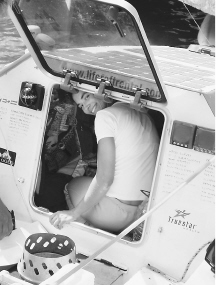
Sitting inside the cabin while moored in St. Lucia.
PHOTO:
ANGUS ADVENTURES
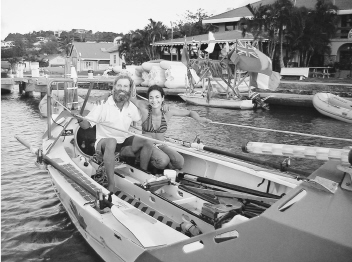
Celebrating our arrival in St. Lucia after rowing from Lisbon, Portugal.
PHOTO: ANGUS
ADVENTURES
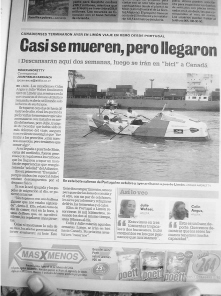
One of the Costa Rican newspaper articles that covered our journey.
PHOTO: COLIN ANGUS
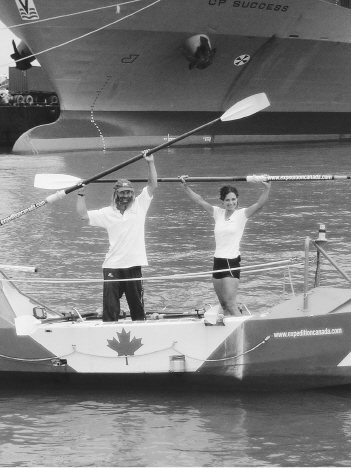
Reaching Port Limón on the east coast of Costa Rica after rowing ten thousand kilometres from Lisbon, Portugal.
PHOTO: ANGUS ADVENTURES
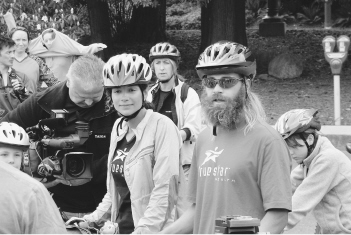
Celebrating the completion of the expedition in Vancouver after cycling 8,300 kilometres from Costa Rica.
PHOTO: ANGUS ADVENTURES
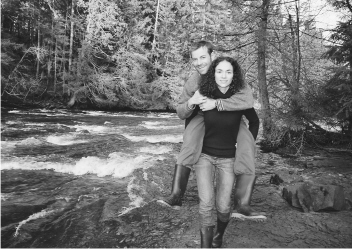
Hiking along the Puntledge River, near our home on Vancouver Island, after completing the expedition.
PHOTO: JULIE ANGUS
10
ENCOUNTERS WITH A
LOVESTRUCK TURTLE
D
ISTANCE TAKES ON
a different meaning when you move through a landscape that never changes. On the open ocean, only a gently curving horizon cuts a line between blue sky and cerulean sea. There is nothing to indicate forward progress, no milestones to check off—just a hope that the
GPS
is accurate. Nothing on terra firma can compare; even the most unchanging lands offer slight aberrations—hills, shrubs, dunes, rocks—to be used for reference.
Our lives were now governed by firmly established, unchanging routines, and the days swallowed each other, each one shaped from the same cookie cutter. We rowed for twenty hours and travelled between fifty and eighty kilometres. The weather was warm, the winds not too strong, and the sky was sunny, dotted with fluffy, innocent clouds. Sporadically, we saw tuna, dorado, and flying fish; occasionally we were visited by dolphins or whales. Our conversations revolved around the mundane as well as the philosophical. Conditions were better now, but our overall progress was far from ideal. In forty-nine days, we had rowed only one-quarter of the distance to Miami. If we continued at this speed, our supplies would be depleted long before reaching land.
Two days before—nine days after leaving the Canary Islands—the weather had briefly taken a peculiar turn. A thick cloud cover created a dark, shadowy world, and a dense haze reduced our visibility to just two or three kilometres. I wondered if it was created by fine sand being blown out to sea from the deserts of Africa, a phenomenon we’d read about in our pilot book. Our speed dropped by
40
per cent, and we faced steeper swells with shorter wavelengths.
“It’s the currents,” Colin said, looking at the
GPS
. “They’re no longer flowing southwest, but have reversed, pushing straight into the winds. When the winds and currents are not unified, they create a wind-over-current situation, which creates choppy seas.”
“Why would the currents and winds flow in different directions?” I asked. “I thought surface currents were created by the winds.”
“That’s usually the case. Generally, currents are created by prevailing winds, but the water can continue flowing great distances from momentum, even pushing into contrary conditions as it is now. Based on the information in our charts, though, it’s not common for currents to flow northward here.”
The boat rocked violently in the steep waves, and for the first time in weeks, I felt queasy. We had to continue rowing hard to move out of this strong current. But we had no way of knowing where the edges of the flow lay. The great, fluid movements of the ocean are constantly changing, and satellite technology does not have the means to detect ocean currents. We could only hope to bumble our way along.
We decided to clean the bottom of the boat to help increase our speed. It was my turn, but a splitting headache all but incapacitated me. So I kept watch, and Colin jumped overboard with the mask and snorkel to scrape the barnacles. He gripped the safety line with one hand and rubbed off crustaceans with the other. The boat bounced wildly in the waves, and I worried the hull would hit him.
“I can’t believe how fast these guys grow,” Colin said as he surfaced between dives.
“Just be quick,” I said. “It’s hard to see in these choppy waters.” I scanned the horizon and the water beneath the boat for sharks. My polarizing sunglasses helped cut what little glare was on the surface, but visibility was still poor.
Colin submerged again. I squinted—nothing in the distance, nothing under the boat. What if a shark snuck up? What if I didn’t see it? The risk just didn’t seem worth it.
Colin had already been in the water for ten minutes scraping off hundreds of barnacles, meaty morsels that rained into the ocean depths like the ringing of a dinner bell to all predators. I turned to scan the waters behind me, and a dark shadow flickered.
“
SHARK
!” I screamed. “Get in the boat, now!”
Colin shot to the surface and got into the boat in one fluid motion. He was panting, and blood dripped from a scratch on his thigh.
“Are you okay?” I asked, pointing to his leg.
“I’m fine,” he said. “It’s nothing.”
Colin’s reaction time had been incredibly quick. Instead of getting into the boat as he usually did, by grabbing the railing and pulling himself up—which would have left his legs dangling in the water for precious moments longer—he had thrown his legs onto the boat first and quickly pulled himself out of the water. The cut was from where he’d rubbed against the boat’s metal oarlock.
“Where is it?” he asked.
“Over there,” I said, pointing to a now-empty area of water. “It was about a metre and a half long and just off the starboard side.”
We scanned the water for a sign of the shark, but found none.
“Maybe it wasn’t a shark after all,” I said sheepishly. “I just saw it out of the corner of my eye.”
“I’d much rather you to be wrong about seeing a shark than wait another minute to confirm that a shark is sizing me up.”
“I don’t think you should scrape the hull anymore,” I said.
“At least not today,” Colin agreed.
Colin dried off and went into the cabin. I started rowing.
“Hey, your scraping job did the trick. We’re going faster than before—about
0
.
3
to
0
.
5
knots faster,” I said, watching the speed reading on the
GPS
.
“That’s great,” he replied. “I only cleaned off about half of them.”
“Now that you mention it, we seem to be tracking a little more to the starboard side. That was the side you didn’t scrape, right?”
Colin looked at me with dismay.
“Just kidding.”
“IT’S TED AND FRED!”
Colin suddenly shouted.
He dropped the oars and peered over the side of the boat. I quickly joined him to view two fish swimming off our portside.
“Are you sure they’re Ted and Fred?” I asked.
“It sure looks like them. Look at their stripes. That one there with the scar is Fred, and remember Ted’s ripped tail—that looks just like him. Maybe they were following our boat from a distance, or somehow they tracked us down again.”
I wasn’t entirely convinced. The fish certainly did look like Ted and Fred, but why hadn’t we seen them all this time? And where were Ned and Oscar? I searched the surrounding waters, but there was no sign of the other half of the quartet. I was excited to have a couple of pets again, and who knows, maybe it
was
them. I tossed a few spoons of leftover rice and corn over the side for the hungry fish.